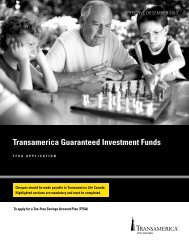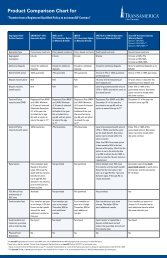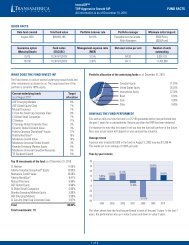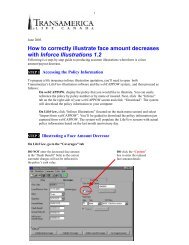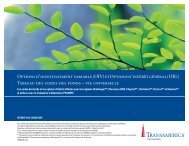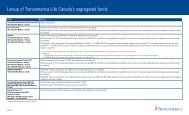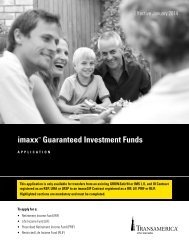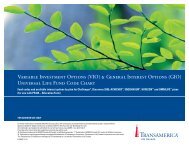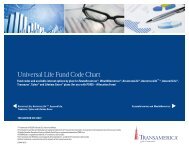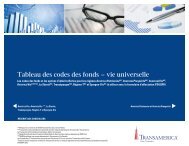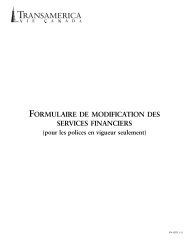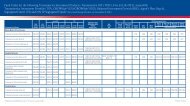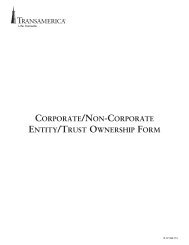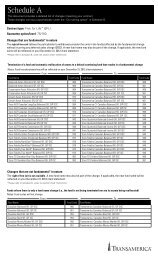imaxx⢠Guaranteed Investment Funds - Transamerica Life Canada
imaxx⢠Guaranteed Investment Funds - Transamerica Life Canada
imaxx⢠Guaranteed Investment Funds - Transamerica Life Canada
- No tags were found...
Create successful ePaper yourself
Turn your PDF publications into a flip-book with our unique Google optimized e-Paper software.
Mortgage-Backed and Asset-Backed Securities RiskMortgage-backed securities are debt obligations backed by pools ofmortgages on commercial or residential real estate. Asset-backedsecurities are debt obligations that are backed by pools of consumeror business loans. Some asset-backed securities are short-term debtobligations, called asset-backed commercial paper (“ABCP”). If thereare changes in the market perception of issuers of these types ofsecurities, or in the creditworthiness of the parties involved, then thevalue of the securities may be affected. In the case of ABCP, there isan additional risk that there may be a mismatch in timing betweenthe cash flow of the underlying assets backing the security and therepayment obligation of the security upon maturity. In the case ofmortgage-backed securities, there is also the risk that there may be adrop in the interest rates charged on the mortgages, a mortgagor maydefault on its obligations under a mortgage or there may be a drop inthe value of the property secured by the mortgage.Multi-Class or Series RiskAlthough a fund may offer separate classes or series of units, thefund is a single legal entity. Accordingly, the investment performance,expenses or liabilities of one class or series may affect the valueof the units of another class or series. In particular, expensessignificantly attributable to a class or series of units will initially bededucted in calculating the unit price only for the class or series ofunits. However, those expenses will continue to be liabilities of thefund as a whole, if there are insufficient assets of a class or series topay those expenses, the remaining assets of this fund would be usedto pay the excess expenses.Municipal Obligation RiskCertain funds may invest in municipal obligations as part of their cashmanagement techniques. In addition to the usual risks associatedwith investing for income, the value of municipal obligations will beaffected by changes in actual or perceived credit quality. The creditquality of a municipal obligation will be affected by, among otherthings, the financial condition of the issuer or guarantor, the issuer’sfuture borrowing plans and sources of revenue, the economic feasibilityof the revenue bond project or general borrowing purpose, politicalor economic developments in the region or jurisdiction where thesecurity is issued and the liquidity of the security. Because municipalobligations are generally traded over-the-counter, the liquidity of aparticular issue often depends on the willingness of dealers to makea market in the security. The liquidity of some municipal issues can beenhanced by demand features which enable the investor to demandpayment from the issuer of a financial intermediary on short notice.Passive Management RiskSimilar to funds that are managed to track an index, some funds mayalso use passive management for a component of the fund, and to thatextent may be subject to similar risks as funds that are managed totrack an index. Please refer to both Index Risk and ETF Risk.Repurchase and Reverse Repurchase Agreements RiskSometimes funds enter into what are called repurchase transactionsand reverse repurchase transactions. A repurchase transaction is wherea fund sells a security to a party for cash and agrees to buy the samesecurity back from the same party at a higher price on an agreed futuredate. In a reverse repurchase transaction, a fund buys a security at oneprice from a third party and agrees to sell the same security back to thesame party at a higher price on an agreed future date.The risk with these types of transactions is that the other party maydefault under the agreement or go bankrupt. In a reverse repurchasetransaction the fund is left holding the security and may not be ableto sell the security at the same price it paid for it, plus interest, if theother party defaults and the market value for the security has droppedin the meantime. In the case of repurchase transaction, the fund couldincur a loss if the other party defaults and the value of the security soldhas increased more than the value of the cash and collateral held.To reduce risks, the other party to the transaction is required to putup collateral to the fund. The value of the collateral has to be atleast 102% of the market value of the security sold (for a repurchasetransaction) or of the cash paid for the securities purchased (for areverse repurchase transaction). Repurchase and securities lendingtransactions (see Securities Lending Risk) are limited to 50% of afund’s assets, excluding the cash held by the fund for securities sold ina repurchase transaction and collateral or sales proceeds received in asecurities lending transaction.Securities Lending RiskSome funds may engage in securities lending transactions. In asecurities lending transaction, the fund lends portfolio securities heldby the fund to qualified borrowers who have posted collateral for a feeand a set period of time. In lending its securities, the fund is subject tothe risk that the borrower may not fulfill its obligations leaving the fundholding collateral worth less than the securities it has lent, resulting ina loss to the fund.To limit this risk, a fund must hold collateral worth no less than 102%of the market value of the loaned securities and the amount of thecollateral is adjusted daily to ensure the level is maintained. Thecollateral may only consist of cash, qualified securities or securitiesthat can be immediately converted into identical securities to thosethat have been loaned. To further limit risk, a fund cannot lend morethan 50% of the total value of its assets through securities lendingor repurchase transactions (see Repurchase and Reverse RepurchaseAgreements Risk) and a fund’s total exposure to any one borrower insecurities, derivative transactions and securities lending must be lessthan 10% of the total value of the fund’s assets.Short Selling RiskSome funds may engage in a limited amount of short selling. A “shortsale” is where a fund borrows securities from a lender and sells themin the open market. The fund must repurchase the securities at a laterdate in order to return them to the lender. In the interim, the proceeds34



